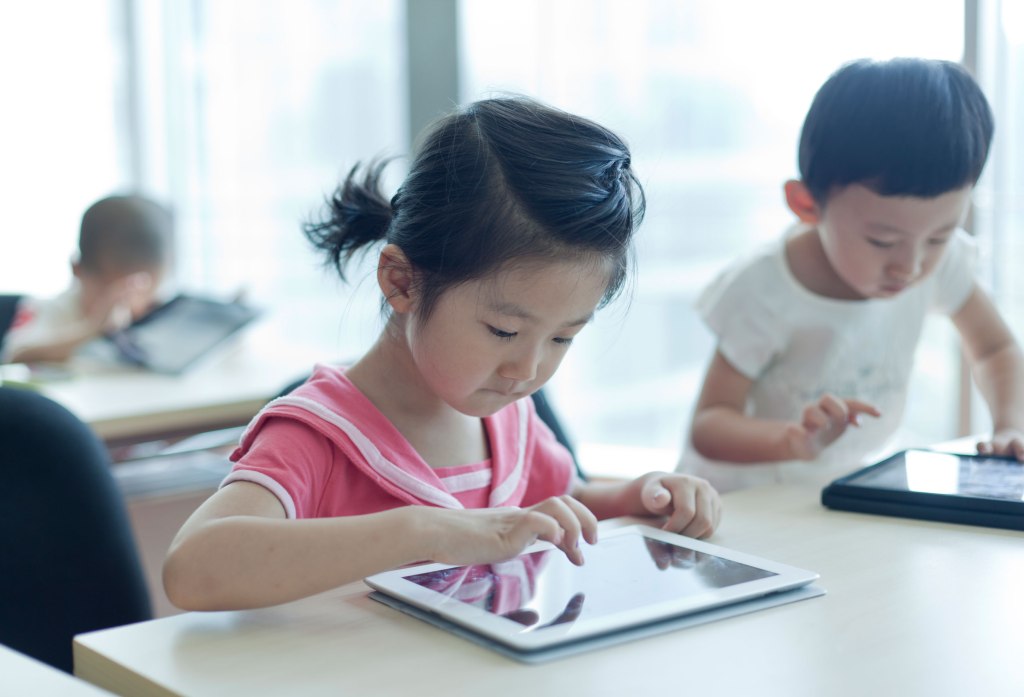In news that will surprise few but still alarm many, a study has found that kids 2-5 years old who engage in more screen time received worse scores in developmental screening tests. The apparent explanation is simple: when a kid is in front of a screen, they’re not talking, walking or playing, the activities during which basic skills are cultivated.
The topic is a thorny one, as there are plenty of arguments on both sides as to the possible pros and cons of screen use at an early age, and as with any other topic pertaining to parenting, it is immediately personal to many people and reliance on anecdote is common. It’s only through studies like this one, these and other researchers note, that we can begin to be sure of anything. (Of course, we must study the studies as well.)
The study, from the University of Calgary psychologists and published today in the JAMA journal Pediatrics, examined the effect of screen time during a developmental period on performance in basic skills at the end of each period — specifically, at 24, 36 and 60 months old. Caregivers reported average screen time, and also filled out standard questionnaires on motor and communication skills.
A rather straightforward correlation appeared in the results:
Greater screen time at 24 months was associated with poorer performance on developmental screening tests at 36 months, and similarly, greater screen time at 36 months was associated with lower scores on developmental screening tests at 60 months.
Importantly, the effect was not bidirectional or ambiguous — kids with more screen time usually had lower scores, but kids with lower scores didn’t necessarily have more screen time. This strengthens the hypothesis that screen time leads to lower scores instead of an unknown variable or variables affecting both.
The exact mechanism can’t be tested with the present data, but lead author Sheri Madigan suggests it isn’t exactly mysterious:
“A lot of the positive stimulation that helps kids with their physical and cognitive development comes from interactions with caregivers,” she said in a University of Calgary news release. “When they’re in front of their screens, these important parent-child interactions aren’t happening.”
And not just those, either. The paper explains in a bit more detail:
When young children are observing screens, they may be missing important opportunities to practice and master interpersonal, motor, and communication skills. For example, when children are observing screens without an interactive or physical component, they are more sedentary and, therefore, not practicing gross motor skills, such as walking and running, which in turn may delay development in this area. Screens can also disrupt interactions with caregivers by limiting opportunities for verbal and nonverbal social exchanges, which are essential for fostering optimal growth and development.
It’s hard to find a counter-argument to this. Screen time isn’t just plain bad, and as many have pointed out its ubiquity precludes the possibility of avoidance. So the question is not “whether or not” but “how much?”
And while there are arguments for dividing screen time into high and low quality, or beneficial and non-beneficial (these are not differentiated in the study), those are much more applicable for older children who are capable of engaging with it in more sophisticated ways. At very early ages it’s hard to deny that a child’s time is better spent on activities through which they advance their most basic skills.
For reference, the kids in the study were averaging 2-3 hours per day. But it’s important to note that there isn’t some magical number of hours that’s okay or harmful — “Unfortunately, we can’t derive this ‘tipping point’ from the statistical analyses that we provided,” Madigan told me in an email. “It will be an important avenue of our future research.”
So you need to hide all screens from your kids and worry like mad if they somehow manage to wheedle an extra half hour of Dora time out of you while you finish dinner. The implication isn’t that screen time is inherently bad but that it risks replacing the “high quality caregiver-child interactions” that are so critical at this period of development. The solution therefore is not necessarily less screens, but more and better time spent with the kid.
Giving parenting advice is well outside the scope of a tech blog, but as an uncle and generally speaking as a human, I think it’s safe to say that there are great ways of integrating screen-based content with ordinary play, and in fact many companies are dedicated to that possibility.
Playing a game ought not to adversely affect communication if it’s a kid collaborating on a Minecraft base with their sibling, right? Or if a show is being watched in an active way that encourages communicating and trying new things? A parent will know best, but it’s important to pay attention in the first place, and establishing causal connections like the one suggested in this study is one more reason to do so.
I’ve asked the researchers a few questions about the study and will update this post if I hear back.





























Comment